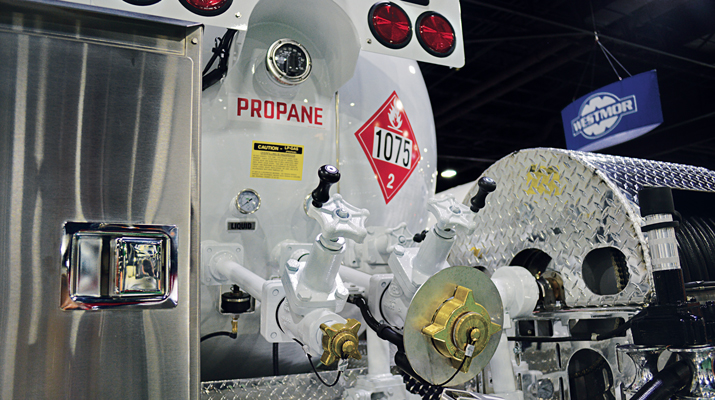Propane Fuels America: Rhode Island
LP Gas’ yearlong Propane Fuels America series takes a deep dive into how each state benefits from the propane industry. Here’s our report on Rhode Island.
Total odorized propane demand (2019): 29 million gallons
U.S. rank for gallons sold: 49
Gallon sales trend: Rhode Island sold 25 million gallons of propane in 2017 and 29 million gallons in 2019, an increase of 16 percent.
Census region/division gallons: Northeast: 1.69 billion/New England: 775 million
Propane autogas school buses/districts and contractors: 95/5
Market pointers

Some state politicians want propane to be used only in peak-demand situations such as blizzards, posing a threat to the industry. Photo: DenisTangneyJr/E+/Getty Images
⦁ The Sea-3 terminal in Providence, Rhode Island, was inactive for a number of years and then brought back into service right before the pandemic began. Officials are looking to bring rail to the terminal, which would allow the state propane industry to blend renewable propane and strengthen propane supply. The proposal has been met with strong opposition from politicians and environmental activists, who say it would hinder environmental justice, a misperception that propane industry leaders are trying to combat.
⦁ While Rhode Island is a small state, it has been setting “very aggressive” goals regarding the environment, says Leslie Anderson of the Propane Gas Association of New England. In fact, a bill was introduced that would require business owners to obtain a “green justice zone permit” by 2022 to operate any kind of business, eliminating the use of all fossil fuels. The bill did not pass, but Anderson says it was “the scariest bill that I’ve seen come across my desk in the last three years.”
⦁ Rhode Island ranks No. 49 in the U.S. in terms of propane gallon sales. According to the Propane Education & Research Council (PERC), the majority of residences rely on natural gas for heating, and electricity meets most of the new demand that comes through.
⦁ While overall gallon sales rank low on a national scale, about 15 percent of school buses in Rhode Island were fueled by propane in 2020 – significantly higher than the national average of 4.5 percent – according to PERC.
⦁ As part of the electrification push in Rhode Island, some officials want to limit the use of propane to be used only for peak demand – such as in the case of blizzards or power outages. “Our industry can’t live on one week a year when the power’s out and the emergency happens,” Anderson says. “We have to be able to stay around. So it’s really critical to talk with our policymakers here about the reliability of propane in addition to how clean-burning it is.”
Fast facts
State association affiliation: Propane Gas Association of New England (PGANE)/pgane.org
Programs: PGANE is working on combining the new branding from the Propane Education & Research Council (PERC) with the association’s branding to regionalize PERC’s message that propane is a clean-energy solution.
Marquee events in 2021: PGANE will host its fall meeting Oct. 13-14 in Portsmouth, New Hampshire.
Before COVID-19: The propane industry in Rhode Island had contributed more than $460 million to the 2018 state economy. It’s too early to assess COVID-19’s impact on the state’s gross domestic product.
“Our industry can’t live on one week a year when the power’s out and the emergency happens. We have to be able to stay around.” – Leslie Anderson, president and CEO, Propane Gas Association of New England
What’s the weather?
Average temperature (2020): 52.8 degrees F
Annual heating degree-days five-year average (2015-19): 5,655
U.S. average: 4,090
Sources: Propane Education & Research Council’s U.S. National and State Propane Market Profiles; Annual Retail Propane Sales Report; propane.com; Propane Gas Association of New England; U.S. Energy Information Administration’s State Energy Profiles
















